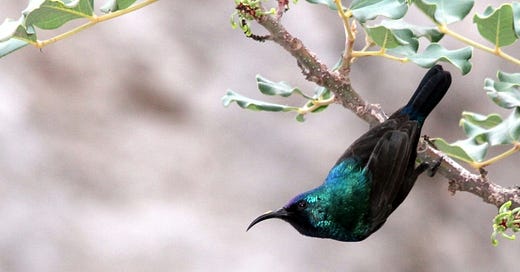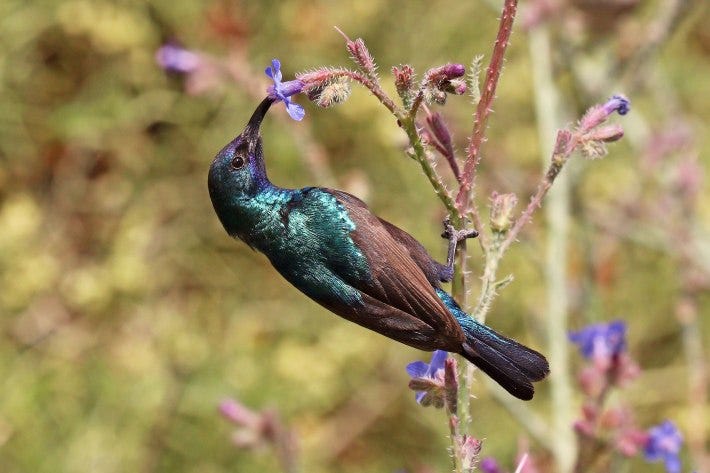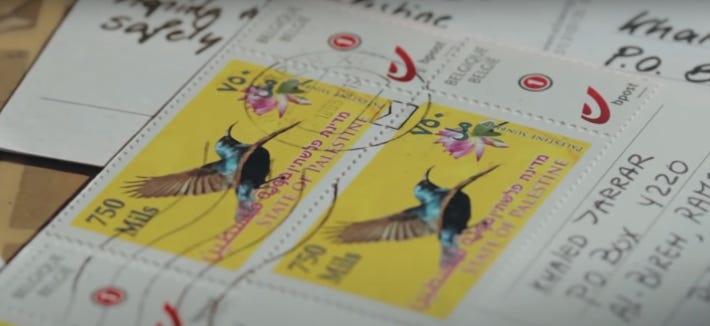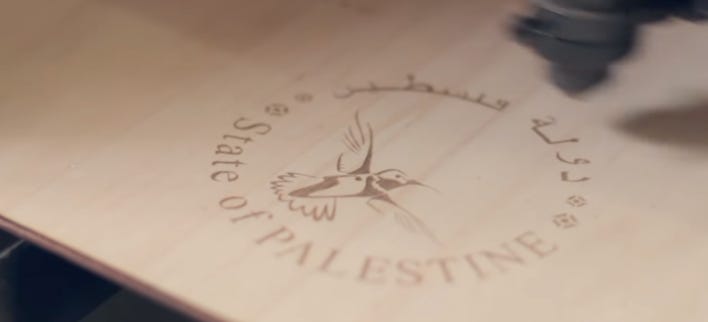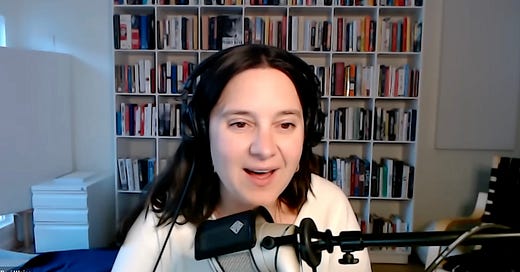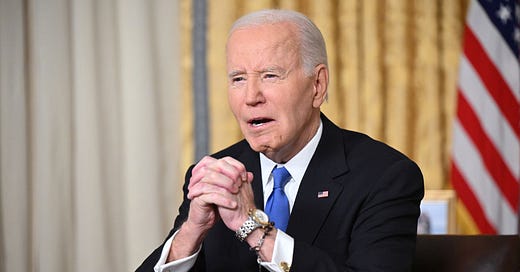
Bird of the Week: Palestine Sunbird
This is Discourse Blog's last post of the year. We'll see you in 2022!
Our final Bird of the Week of 2021 is the Palestine sunbird.
This bird has many great qualities. First, the look.
Undeniable. So stunning you could almost weep. (This is a male sunbird; the females are much less colorful but still very cute.) The Palestine sunbird can be found all over the Middle East, in Syria and Jordan and Lebanon and Yemen and Oman and Saudi Arabia and, yes, in Palestine (and Israel). It even pops up in parts of Africa.
The sunbird is part of the Nectariniidae family, which means, guess what? It loves nectar! (Also insects, but especially nectar.) It has a big, curved beak designed especially to get at the nectar. Here's a cool video of a sunbird doing its nectar thing, as well as showing off its trilling call. (I love bird calls!!!) According to Haaretz, the sunbird can distinguish between the sugar content of various flowers when trying to figure out its next meal, and can sing in several different sunbird dialects.
I am going to tip my hand, though: I like the Palestine sunbird a lot as a bird, but the reason I was so drawn to it as 2021’s last Bird of the Week is mostly contained in the first part of its name. The Palestine sunbird is not just a bird—it’s a vivid symbol of Palestinian resistance, and resistance (the real and good kind, not the #Resistance kind) is one of the things we need most in this world.
Loving birds, like just about everything else, is not easy in Palestine. A poignant article in Mongabay profiles the struggles of a birder named Anton Khalilieh who lives in the occupied West Bank. The article notes that some of the best bird-watching spots in the West Bank are found in the illegal Israeli settlements, which are no-go areas for Palestinians. It also has this crushing paragraph:
In places like the Wadi Qana Nature Reserve, a beautiful expanse of natural caves and springs in the West Bank, both Khalilieh and Quttainh said they love to bird watch but feel they have to tread carefully as Palestinians so as not to raise suspicions about what they are doing or veer into the settlements by accident.
To be Palestinian is to have even bird-watching turn into something fraught and dangerous. Perhaps that is why the Palestine sunbird has taken on such resonance.
The bird has been adopted by the Palestinian Authority as a national bird. It also adorns the logo placed on exported Palestinian goods. And, most intriguingly, an artist named Khaled Jarrar has put it on passport and postage stamps. There’s a moving Al Jazeera documentary about Jarrar that I’ll embed here. In it, Jarrar says that he chose the sunbird because he was “looking for something that expresses freedom.”
“This bird is a symbol of freedom and movement,” he says. “It can fly anywhere.”
According to Al Jazeera, the postage stamps have actually been recognized by postal services (ie, you can use them to send letters) in Germany, Belgium, the Netherlands, Norway and the Czech Republic. The passport stamps are a different matter, presumably because they are a more provocative declaration of statehood and self-determination. In the documentary, Alison Ramer, an American-Israeli friend of Jarrar’s whose Israeli passport he stamped with the emblem recounts the trouble it got her into at an Israeli airport:
The manager came to me and he said, "What is that you’ve put in your passport?" I said, "This is the stamp of Palestine. It’s the Palestinian visa.’ And he said, "There is no such place as Palestine." I said, "What, you didn’t know? Palestine was a state before Israel." And at this moment, he took me to the interrogation. I spent a number of hours there, and in the end, my passport was canceled.
Now, the sunbird itself was not the main issue here, but it still matters. There is a reason that, when Jararr was searching for an image of Palestine that would contain beauty and freedom and rebellion, he chose a little bird that feeds on flowers and sings in different dialects.
Nature carries deep meaning for everyone. Access to and understanding of nature is as political as anything else in this world. Little birds matter a great deal.
A reminder: you can check out our complete Bird of the Week list here, and get in touch with your bird suggestions at hello@discourseblog.com.


